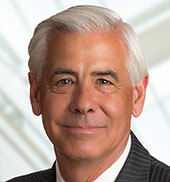SUPREME COURT OF THE UNITED STATES
- OVERVIEW
- EXPERIENCE
- INSIGHTS
- NEWS & EVENTS
- PROFESSIONALS
CONTACT
- Warren Dean, Jr.
- 202 585 6908 202 585 6908 direct | Email
- Katie Kraft
- 202 585 6966 202 585 6966 direct | Email
Thompson Coburn’s experience in fields important to its sophisticated client base takes the firm’s lawyers to the nation’s highest court.
The firm’s Supreme Court experience includes:
- the regulation of foreign commerce;
- the breadth of patent rights to protect innovation;
- the relationship between federal and state law regulating commerce;
- the reach of the bankruptcy code; and
- the scope of sovereign immunity.
Our lawyers have argued, and filed amicus curiae briefs, in some of the important decisions of the Rehnquist and Roberts Courts.
Major Supreme Court Cases
Franchise Tax Board v. Hyatt, Docket N. 14-1175 (2015)
This case asks the Court to overrule its 1979 sovereign immunity decision, Nevada v. Hall, holding that 11th Amendment state sovereign immunity does not preclude a private suit against a state filed in the courts of another state. Because of the similarity of the issues, the court’s decision in Fed. Mar. Comm’n v. S.C. State Ports Authority, argued by Thompson Coburn partner Warren Dean, figures prominently in the resolution of the question whether Hall should be overruled. Dean, with support from Partners Jon Benner and Katie Kraft, filed an amicus brief in Hyatt on behalf of the South Carolina Ports Authority, in which the Attorney General of the state of South Carolina joined, in support of reversal of Hall. The brief addressed the importance of sovereign immunity to investment in transportation infrastructure like ports.
Northwest v. Ginsberg, Docket No. 12-462 (2014)
On behalf of the International Air Transport Association (IATA), Thompson Coburn lawyers Warren Dean, Jonathan Benner and Katie Kraft filed an amicus brief in support of Petitioner Northwest. The case involved federal preemption of implied contractual covenants under state law. IATA’s amicus brief focused on the international implications of that question, arguing that the lower court’s decision compromised the Federal Government’s ability to speak with “one voice” in matters of foreign commerce and created impermissible conflicts with the Federal Government’s policies and obligations in the international sphere. Siding with Petitioner Northwest and the amici supporting Petitioner, the Court unanimously reversed the judgment of the Ninth Circuit, finding that the federal law pre-empted a state law claim for breach of an implied covenant that seeks to enlarge the contractual obligations voluntarily adopted by the contracting parties.
Bowman v. Monsanto Co., Docket No. 11-796 (2013)
This case concerned patent rights after the first sale of self-replicating technology, which had broad implications for innovation across a broad range of industries. In 2009, Thompson Coburn partners Jeff Masson and Dan Cox received summary judgment for Monsanto in the U.S. District Court for the Southern District of Indiana. The District Court concluded that Mr. Bowman had no right to make copies of Monsanto’s patented technology. The U.S. Court of Appeals for the Federal Circuit upheld that decision in 2011. In October 2012, the Supreme Court agreed to review the case. Thompson Coburn partners Masson and Cox, with partner David Jinkins, co-authored Monsanto’s brief on the merits. The Court ruled unanimously for Monsanto, affirming the Federal Circuit’s ruling.
Sawyer v. Iqbal, 556 U.S. 1256 (2009) decided by Ashcroft v. Iqbal, 556 U.S. 662 (2009)
Jonathan Benner was counsel of record for a team representing a former director of the Federal Bureau of Prisons who had been sued, along with other federal officials including Attorney General Ashcroft, by a Pakistani citizen alleging tortious conduct arising from his detention following the 9/11 attacks on the Pentagon and the World Trade Center. Although the case arose from law enforcement activity in response to the 9/11 attacks, the decisional question addresses the degree of specificity that a civil complaint must achieve to survive a Motion to Dismiss filed under the Federal Rules of Civil Procedure. The Court held that a complaint must be facially non-conclusory, i.e., based on allegations of fact that are believable under the circumstances, to survive Motion to Dismiss. The case is frequently cited along with Bell Atlantic v. Twombly in civil settings in support of more rigorous pleading requirements now being required by federal courts.
Exxon Shipping Co. v. Baker, 554 U.S. 471 (2008)
Jonathan Benner represented amici international shipowner groups in supporting a challenge to the award of punitive damages arising from the EXXON VALDEZ oil spill that vastly exceeded actual damages ($2.5 billion versus $500 million). The Court held that punitive damages in maritime cases could not exceed amounts awarded as actual damages. Dicta suggest that punitive damages in relation to actual damages should not exceed a ratio of 0.65 to 1. The case, specific to maritime claims, is part of a continuing interest by the Court in the balance between compensation and deterrence in the award of damages.
District of Columbia v. Heller, 554 U.S. 570 (2008)
In support of the prevailing party in this landmark Second Amendment gun case, Thompson Coburn partners prepared an amicus brief that was cited by the U.S. Supreme Court in the related case of McDonald v. City of Chicago, 561 U.S. 742 (2010).
Norfolk Southern Railway Co. v. Sorrell, 549 U.S. 158 (2007)
In this case, the Court held that Missouri courts’ interpretation and application of a federal statute was contrary to federal law, as interpreted by federal courts. The Court’s decision effected a change in Missouri mandatory jury instructions that had been in force for decades. Thompson Coburn partner David Dick handled the case in the Missouri trial and appellate courts, and co-authored Petitioner Norfolk Southern’s brief on the merits. The Court unanimously ruled in Norfolk Southern’s favor.
Federal Maritime Commission v. South Carolina State Ports Authority, 535 U.S. 743 (2002)
In this landmark Constitutional case, the Court held that states and their instrumentalities are entitled to sovereign immunity in proceedings before federal administrative tribunals. Warren Dean successfully argued before both the U.S. Court of Appeals for the Fourth Circuit and the Supreme Court that the principle of state sovereign immunity reflected in the 11th Amendment transcended its literal language to apply to proceedings before federal agencies and was not limited to cases filed in Article III courts. The decision, one of the most significant in what may be the oldest line of Supreme Court cases, affirms the dual sovereignty inherent in our federal system of government.
Intertanko v. Locke, 529 U.S. 89 (2000)
Here, the Court held that Federal law preempts State of Washington environmental and safety regulations related to vessel operations in state waters. Thompson Coburn partner Jonathan Benner argued that the state’s regulations must yield to federal rules on the same subject and obtained a unanimous opinion in favor of an association of international shipping companies.
El Al v. Tseng, 525 U.S. 155 (1999)
Warren Dean successfully represented the U.S. airline industry as amicus and worked with the Solicitor General to argue that the international treaty rules of the Warsaw Convention exclusively occupied the field relating to the compensation of airline passengers and shippers.
Other Experience
Japan Line v. County of Los Angeles, 441 U.S. 434 (1978)
While in government, Warren Dean prepared the position of the United States and authored the dispositive brief of the United States in this landmark case involving the preemption of state taxes in the foreign commerce of the United States.
Publications
Bankruptcy Code § 363(m) is now up for interpretation at the U.S. Supreme Court
How the Atlantic Richfield decision may impact the EPA Model Consent Decree template
Supreme Court expands reach of Clean Water Act to cover some discharges to groundwater
News
Roman Wuller Named St. Louis United Way Board Chair
Thompson Coburn strengthens national appellate practice with Dallas addition of Justice Douglas Lang
U.S. Supreme Court unanimously sides with position of Thompson Coburn airline client
Thompson Coburn files U.S. Supreme Court brief for international airline group
|
Senior Counsel
|
Washington, D.C.
|
Jonathan focuses on regulatory issues and litigation affecting domestic and international maritime and shipping matters, as well as international trade regulation issues ... Jonathan focuses on regulatory issues and litigation affecting domestic and... |

|
|||||
|
Partner
|
Washington, D.C.
|
Warren Dean practices in the field of federal regulation of transportation services, both domestic and international. Warren Dean practices in the field of federal regulation of transportation ... |

|
|||||
|
Partner
|
St. Louis
|
David Dick is the firm's general counsel. David Dick is the firm's general counsel. |

|
|||||
|
Partner
|
Dallas
|
Jenny is an experienced and strategic trial lawyer focusing her practice on health care, social justice, white-collar fraud and complex commercial litigation. Jenny is an experienced and strategic trial lawyer focusing her practice on... |

|
|||||
|
Partner
|
Washington, D.C.
|
Katie advises public transit agencies around the country on a variety of regulatory and compliance issues, including public sector procurement, project delivery, Buy Amer... Katie advises public transit agencies around the country on a variety of re... |

|
|||||
|
Senior Counsel
|
St. Louis
|
Mike has extensive experience in complex litigation, including products liability, RICO, toxic tort claims, and contract disputes. Mike has extensive experience in complex litigation, including products lia... |

|
|||||
|
Partner
|
St. Louis
|
Dudley is an Assistant General Counsel for the firm. Dudley is an Assistant General Counsel for the firm. |

|
|||||
|
Partner
|
St. Louis
|
Roman is the former chair of Thompson Coburn. Roman is the former chair of Thompson Coburn. |

|
|||||
